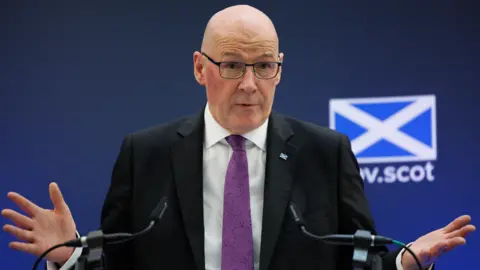Scottish winter fuel payment 'not less than UK rate' - Swinney
 PA Media
PA MediaWinter fuel payments for Scottish pensioners will not be less than those being paid by the UK government south of the border, John Swinney has said.
The first minister made the announcement after Chancellor Rachel Reeves U-turned on a highly controversial cut.
The Scottish government had already said it would provide at least £100 to all pensioner households, with those on pension credit to receive up to £305 depending on their age.
But in a speech in Glasgow, Swinney confirmed no Scottish pensioner "will receive less than they would under the new UK scheme", without giving further details.
Under the chancellor's scheme, every household with a person over the state pension age in England and Wales and an income of up to £35,000 will receive £200 for those aged up to 80 and £300 for those aged over 80.
For those with an income of more than £35,000, the money will be recouped through the tax system.
Reeves was heavily criticised for cutting universal entitlement to winter fuel payments in September last year, with only those on Pension Credit or other benefits eligible.
The Scottish government was due to take over responsibility for winter fuel payments in September - but the introduction of a new universal benefit was delayed after the UK government decision.
 Getty Images
Getty ImagesThe Scottish government later committed to launching its own winter fuel payment by late 2025.
Under the plan, all households with a person over state pension age would receive an automatic £100 payment.
That is to increase to £203 for those under the age of 80 on pension credits, and to £305 for those older than 80.
It also includes an "opt-out" system for pensioners who are better off, meaning they can return the payment to the Scottish government or donate it to charity if they feel it is unnecessary.
'Financial reality'
At the event in Glasgow, Swinney said: "Keeping the winter fuel payment looks after our pensioners, but it also looks after our NHS.
"That is the sharp financial reality of the prevention principle in action. It is one of the reasons we were so quick to step in to protect pensioners in Scotland as best we could from that wrong decision by the UK government.
"And now they have seen the error of their ways, my government will once again do right by Scotland's pensioners."
He added that further details would be "set out in due course".
The changes announced by the chancellor last week will result in a funding increase for the Scottish government, which the first minister later told reporters is expected to be about £120m.
The first minister also acknowledged Scotland's public services "strain at the seams".
He said that there had to be "fundamental change" in how services are delivered, and called for more focus on prevention and early intervention.
Responding to Swinney's announcement, a UK government spokesperson said it was "right that support for fuel costs is targeted".
Scottish Conservative social security spokesperson Liz Smith said both the UK and Scottish governments had been forced into "humiliating" U-turns.
She said: "Labour and the SNP created huge anxiety, uncertainty and financial hardship for pensioners up and down the country and that betrayal will not be forgiven or forgotten."
Scottish Labour deputy leader Jackie Baillie said: "The truth is the SNP has had almost two decades to fix the challenges our country faces and it has failed to do so.
"This is a government that is flat out of ideas and quickly running out of time."

It's not surprising that the Scottish government has decided to make its scheme more generous.
The changes to the UK government's payment meant that there was around £120m extra funding released for Scottish ministers to play with.
And it would have been awkward for some low-income pensioners to be getting less north of the border when compared to people in England and Wales.
The schemes are still different – Scotland will maintain a universal payment while the UK government payment has an income cut-off of £35,000.
Some will question if rich Scottish pensioners really need taxpayer help with their bills.
But Scottish ministers maintain this is the best way to ensure no pensioner slips through the net and goes cold over the winter.
